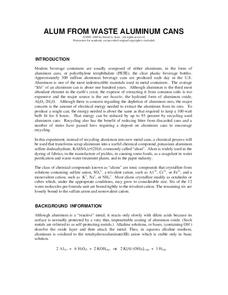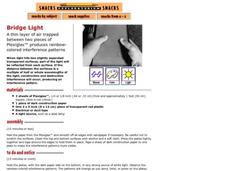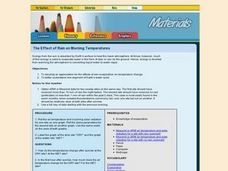Chymist
Alum from Waste Aluminum Cans
Turn aluminum cans into pickles! An engaging experiment has learners chemically change aluminum into a substance with many purposes including the manufacture of pickles. After performing the chemical conversion, the experimenters verify...
Serendip
Cells as Molecular Factories
Cells are both made of molecules and make molecules all at the same time! An exploratory lesson provides a means for scholars to research the components of cells made of molecules and also investigate the molecule-producing power of...
EnLiST
Trap Your Own Insects: What’s in Your Backyard?
Young entomologists construct three types of insect traps—pitfall, pollinator, and panel—before setting their traps out and observing what they caught. They then observe what types of insects the different traps attract.
Illustrative Mathematics
How Thick Is a Soda Can II?
Science, technology, and math come together in this one combination exercise. Analyzing the common soda can from both a purely mathematical perspective and a scientific angle allows for a surprisingly sophisticated comparison of...
Curated OER
Atomic Structure and Bonding
Eighth graders discuss and write about what led up to the discovery of the atom. Students label proton, nucleus, electron, and neutron in their notes. Students take notes on electron shells and how different atoms have different...
Curated OER
Climate Change
Students read about climate change and pair share. In this climate change lesson, students take notes on a worksheet from the readings. Students each read a part of an article and share what they have learned.
Curated OER
Tissues
In this tissue worksheet, students are given notes on 6 types of epithelial tissues, 10 examples of connective tissue, three types of muscular tissue and the components of nerve tissue.
Exploratorium
Bridge Light
An illuminating activity demonstrates how interference of light waves creates a pattern. Using Plexiglas™ and construction paper, participants see rainbows appear as they twist or press against the plastic plates. After the activity, you...
Mary Pope Osborne, Classroom Adventures Program
Mummies in the Morning Egyptian pyramids, hieroglyphics
Visit the Magic Treehouse and take your class on a trip through time with a reading of the children's book Mummies in the Morning. Using the story to spark an investigation into Egyptian culture, this literature unit engages...
Curated OER
Chew On This!
Learners develop pamphlets for a dental health mentoring program that educates younger students about caring for their teeth. They recall experiences at visits to dentists and consider why some students may have poor dental health.
Curated OER
The Greenhouse Effect
Eighth graders research the Greenhouse Effect on the Internet. They use a variety of sources and take notes on the topic. They use ClarisWorks to type a report, use spellcheck, proof and edit. They can create a class bulletin board.
Curated OER
Materials 2: Recycled Materials
Learners are introduced to the idea that some materials can be recycled. They will investigate the types of materials that can be reused, as well as potential uses for each type of recyclable material.
Curated OER
Building on the Past
Students consider how the scientific advances of the past have contributed to the science topics reported on today in the Science Times section. After reading a current science article, they compare and contrast the way science was...
Curated OER
The Sounds of Science
Students assess the relationship between music and science by learning how various musical instruments work. They create a poster, presenting the research conducted in class that focuses on a specific musical instrument.
Curated OER
A Guide (on the Side) to Physics
Students engage in a lesson that is concerned with the concepts related to the study of Physics. They participate in class discussion and list common misconceptions of Physics. Students write and discuss the problem of Science illiteracy.
Curated OER
Composite Materials: merit badge
In this composite materials worksheet, students use their workbook to answer short answer questions about composite materials. Students complete 6 questions total to get their merit badge.
Curated OER
The Effect of Rain on Morning Temperatures
Eighth graders study the effects of the water cycle. They create a graph of the air temperature versus solar radiation on a rainy and clear 24 hour period using data from a provided link. Afterward, they answer questions to determine the...
Curated OER
Tornadoes (Safeside)
Students investigate and demonstrate the science behind the development of tornadoes.
Curated OER
Wind and Wildfire
Emerging scientists research weather-related vocabulary terms, and map out where wildfires are most likely to occur. To bring this lesson to life, you could demonstrate what happens to a fire when you cool or remove the fuel, or cut off...
Curated OER
Life Science: Plant Life Cycles
Practice defining words that have to do with plant life cycles. The list included here is mainly for structural units, but could be used to review their relevance and the process of the life cycle.
Curated OER
Report on Desert Plant or Animal
Students are introduced to desert plants and animals. They demonstrate that the name of an organism does not always match the object. Students perform a guided internet search in order to complete a report.
Curated OER
On the Trail of the Hudson's Migratory Fish
Using data related to the fish in the Hudson River area, learners calculate distance, elapsed time, and growth. They learn about migratory fish, the life cycle of a fish, analyze a map, and answer questions.
Curated OER
Notes on Cell Organelles
Middle schoolers record information and write journal entries on the structure and function of cell organelles while viewing a Powerpoint presentation.
Curated OER
The Science of Aging
Students reflect on the lives of older people they know, then research and debate the key issues surrounding scientific experimentation in anti-aging. They write a short story that reflects their own philosophical beliefs on aging and...

























